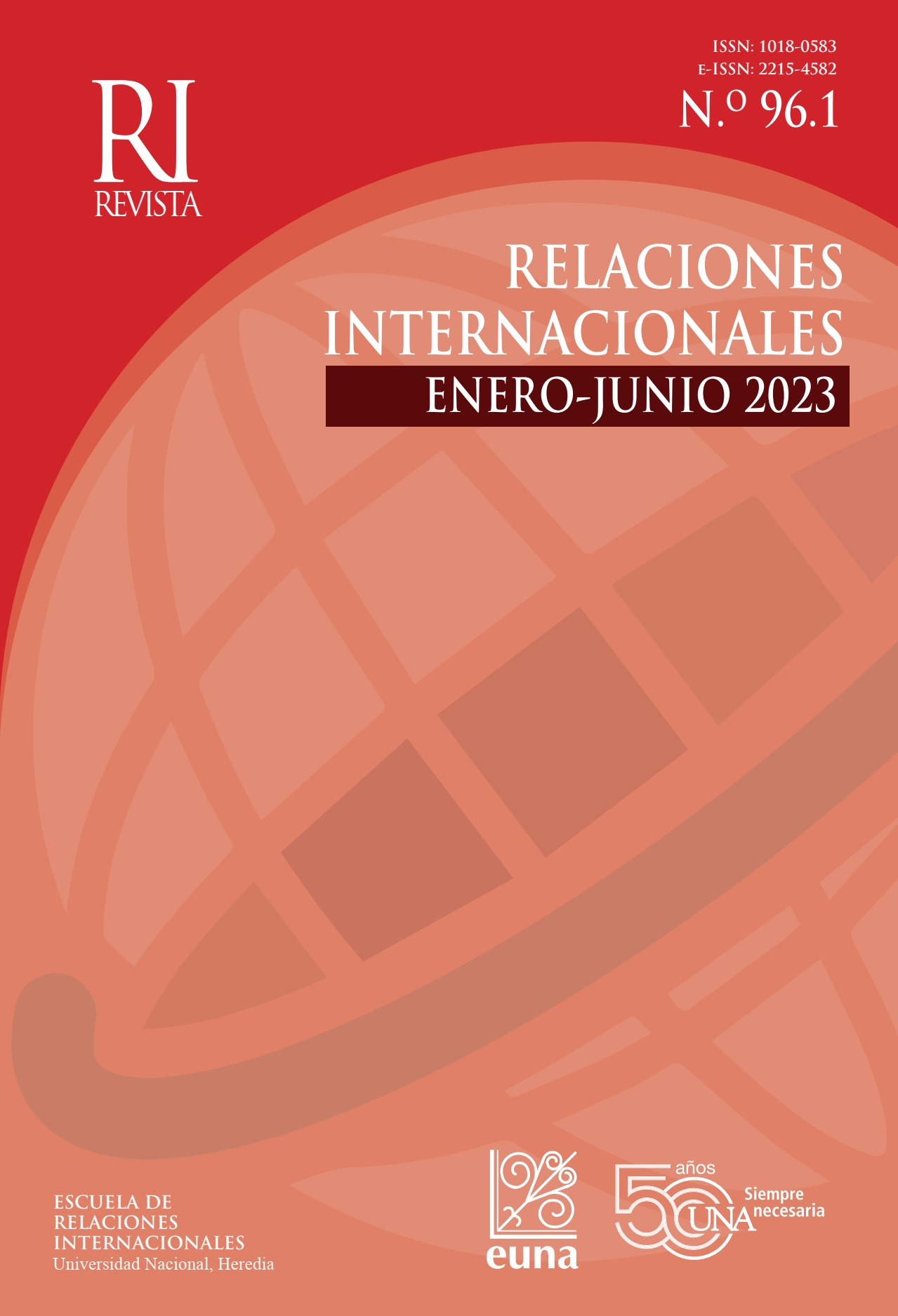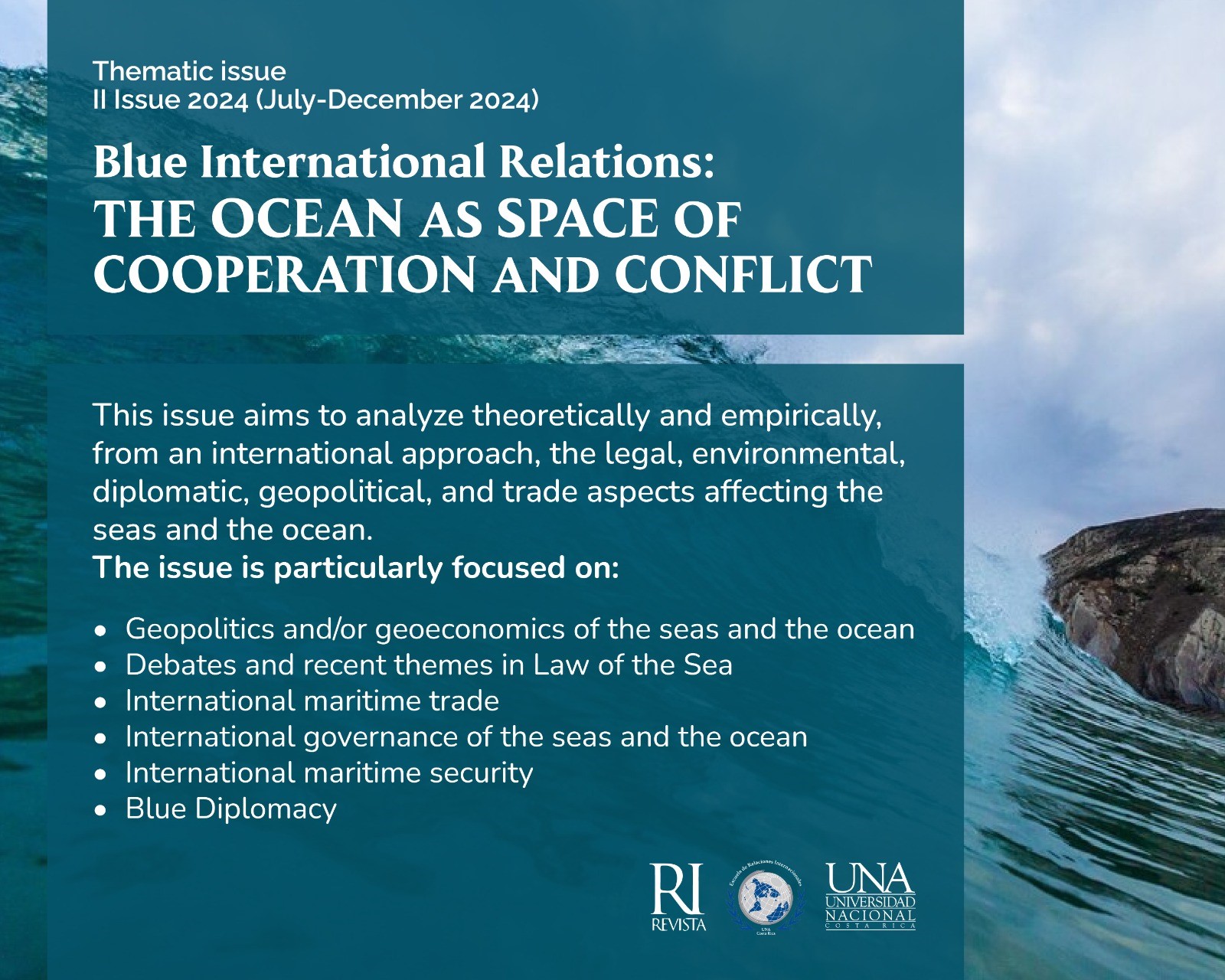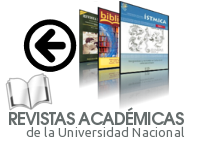Hannah Arendt: Reflections on her Potential Contributions to the International Relations Discipline
DOI:
https://doi.org/10.15359/ri.96-1.1Keywords:
Hannah Arendt, Human Rights, International Relations, theories, totalitarianism, politicsAbstract
This article aims to explore some ideas present in the work of Hannah Arendt that could be useful to inform debates, issues, and theories of International Relations. As this topic was not frequently tackled by the author, the reconstruction of her thought on the matter will be based on different series of her excerpts. In addition, the opinion of some experts on the topic will be studied to further elucidate her perspective on the discipline. Thus, this article aims to find new approaches to keep expanding the field of International Relations theories with novel contributions, as it is the case of Arendt’s ideas.
References
Altini, C. (2005). La fábrica de la soberanía. Maquiavelo, Hobbes, Spinoza y otros modernos. Buenos Aires: El cuenco de plata.
Andersson, H. E. (2016). “Liberal Intergovernmentalism, spillover and supranational immigration policy”. En Cooperation and Conflict (51) 1, pp. 38-54. https://www.jstor.org/stable/48512876
Arendt, H. (1972). Crises of the republic. Nueva York: Harcourt & Brace.
Arendt, H. (1992). Sobre la revolución. Madrid: Alianza Editorial.
Arendt, H. (1994). The Origins of Totalitarianism. Nueva York: Harcourt & Brace.
Arendt, H. (1995). “Karl Jaspers: Citizen of the World?”. En Men in Dark Times. Nueva York: Harcourt & Brace, pp. 81-94.
Arendt, H. (2003a). Los orígenes del totalitarismo. 3. Totalitarismo. Madrid: Alianza.
Arendt, H. (2003b). Conferencias sobre la filosofía política de Kant. Buenos Aires: Paidós.
Arendt, H. (2004). La condición humana. Buenos Aires: Paidós.
Arendt, H. (2005a). “Labor, trabajo, acción. Una conferencia”, “Arendt sobre Arendt”. En De la historia a la acción. Buenos Aires: Paidós, pp. 89-107, 139-171.
Arendt, H. (2005b). ¿Qué es la política? Buenos Aires: Paidós. Arendt, H. (2006). “What is Freedom”, Between Past and Future. Nueva York: Penguin, pp. 142-169.
Bartolomé, M. (2006). La seguridad internacional post 11S: contenidos, debates y tendencias. Buenos Aires: Instituto de Publicaciones Navales.
Birmingham, P. (2006). Hannah Arendt and Human Rights: The Predicament of Common Responsibility. Bloomington: Indiana University Press.
Bourdieu, P. (1996). “Espíritus de Estado”. Revista Sociedad (8), pp.5-30.
Cotter, B. (2005). “Hannah Arendt and «The Right to Have Rights»”. En Lang, Jr., A. F. y Williams, J., Hannah Arendt and International Relations. Reading across the lines. Nueva York: Palgrave Macmillan, pp. 95-112.
Ellis, D. (2011). “The Arc of the Moral Universe is Long, but it Bends Toward Justice”. En The White House. President Barack Obama National Archives. https://obamawhitehouse.archives.gov/blog/2011/10/21/arc-moral-universe-long-it-bends-toward-justice#:~:text=Martin%20Luther%20King%2C%20Jr.%2C,time%2C%20but%20it%20does%20happen.
Fukuyama, F. (1992). El fin de la historia y el último hombre. Barcelona: Planeta-Agostini.
Goldmann, K. (2001). “Relaciones internacionales: una visión general”. En Goodin, R. y Klingemann, H. D. (eds.), Nuevo manual de Ciencia Política. Madrid: Istmo.
Gow, J. (2000). "A Revolution in International Affairs". Security Dialogue (31) 3, pp. 293-306. https://www.jstor.org/stable/26296656
Greblo, E. (2005). Globalización, democracia, derechos. A la medida del mundo. Buenos Aires: Nueva Visión.
Haass, R. (2017). A World in Disarray. Nueva York: Penguin Press.
Habermas, J. (1999). “La idea kantiana de la paz perpetua. Desde la distancia histórica de 200 años”. En La inclusión del otro. Estudios de teoría política. Barcelona: Paidós, pp. 147-188.
Ikenberry, J. (2002). “La gran estrategia liberal y la persistencia del orden hegemónico de Estados Unidos durante la posguerra”. En Política y gobierno, (IX) 1, pp. 13-49.
Ikenberry, J. (2020). A World Safe for Democracy. Liberal Internationalism and the Crisis of Global Order. New Haven: Yale University Press.
Kant, I. (2004). Hacia la paz perpetua. Idea de una historia universal desde el punto de vista cosmopolita. Buenos Aires: Ladosur.
Keohane, R. y Nye, J. S. (1988). Poder e interdependencia: la política mundial en transición. Buenos Aires: Grupo Editor Latinoamericano
Klusmeyer, D. (2005). “Hannah Arendt’s Critical Realism: Power, Justice and Responsibility”. En Lang, Jr., A. F. y Williams, J., Hannah Arendt and International Relations. Reading across the lines. Nueva York: Palgrave Macmillan, pp. 113-178.
Kohn, J. (2005). “Introduction”. En Arendt, H., The promise of politics. Nueva York: Schoken Books, p. xiii.
Lafer, C. (1994). La reconstrucción de los derechos humanos. Un diálogo con el pensamiento de Hannah Arendt. México: Fondo de Cultura Económica.
Lang, Jr., A. F. y Williams, J. (2005). “Introduction”. En Lang, Jr., A. F. y Williams, J., Hannah Arendt and International Relations. Reading across the lines. Nueva York: Palgrave Macmillan, pp.1-26.
Morgenthau, H. (1979). “La política entre naciones”. En Hoffmann, S., Teorías contemporáneas sobre las Relaciones Internacionales. Madrid: Tecnos, pp. 85-105.
Orwell, G. (2007). 1984. Barcelona: Booket.
Oszlak, O. (1982). La formación del Estado argentino. Buenos Aires: Editorial de Belgrano.
Owens, P. (2007). Between war and politics. International Relations and the Thought of Hannah Arendt. Oxford: Oxford University Press.
Parekh, S. (2008). Hannah Arendt and the Challenge of Modernity: A Phenomenology of Human Rights. Nueva York: Routledge.
Pinker, S. (2011). The Better Angels of our Nature: Why Violence Has Declined. Nueva York: Viking Books.
Roncagliolo Benítez, I. (2015). “El principio de no intervención: consagración, evolución y problemas en el Derecho Internacional actual”. En Ius et Praxis, 21 (1), pp. 449-502. https://www.scielo.cl/pdf/iusetp/v21n1/art13.pdf
Sánchez Muñoz, C. (2003). Hannah Arendt. El espacio de la política. Madrid: Centro de estudios políticos y constitucionales.
Schmitt, C. (2001). “El concepto de lo político”. En Orestes Aguilar, H. (ed)., Carl Schmitt, teólogo de la política. México: Fondo de Cultura Económica.
Serrano, C. (2021). “Fin de la monarquía en Barbados: “Nos quitamos el yugo colonial, pero mantenemos la amistad con el Reino Unido”. En BBC News, 30 de noviembre. https://www.bbc.com/mundo/noticias-internacional-59475085
Singh Grewal, D. (2016). “The Domestic Analogy Revisited: Hobbes on International Order”. En The Yale Law Journal, 125 (3), pp. 618-680. https://www.yalelawjournal.org/essay/the-domestic-analogy-revisited-hobbes-on-international-order
Strauss, L. (1959). “Restatement on Xenophon’s «Hiero»”. En What is Political Philosophy? Glencoe: Free Press, pp. 95-132.
Strauss, L. (2006). La ciudad y el hombre. Buenos Aires: Katz.
Vegetti, M. (2008). “Estado total, imperialismo, imperio. Sobre el pensamiento político de Alexandre Kojève”. En revista Deus Mortalis. Cuaderno de Filosofía Política, 7, pp. 35-69.
Vilanova, P. (2003). “Lo nuevo y lo viejo en el sistema internacional”. En Castells, M. y Serra, N. (eds.), Guerra y Paz en el siglo XXI. Una perspectiva europea. Barcelona: Tusquets, pp. 35-52.
Walt, S. (1991). “The Renaissance of Security Studies”. En International Studies Quaterly, 35 (2), pp. 211-239. https://www.jstor.org/stable/2600471
Waltz, K. (1979). Theory of International Politics. Nueva York: Random House.
Weber, M. (1996). Economía y sociedad. México: Fondo de Cultura Económica.
Wendt, A. (1994). “Anarchy is what States make of it: the Social Construction of Power Politics”. En International Organization, 46 (2). https://www.jstor.org/stable/2706858
Williams, J. (2005). “Hannah Arendt and the International Space In-Between?”. En Lang, Jr., A. F. y Williams, J., Hannah Arendt and International Relations. Reading across the lines. Nueva York: Palgrave Macmillan, pp. 199-220.
Young Bruehl, E. (2006). Why Arendt Matters. New Haven: Yale University Press.
Zeevaert, M. (2020). “Spillovers versus Bargaining – Which Integration Theory Explains the EU’s Coronavirus Recession Response?”. En The Yale Review of International Studies, October. http://yris.yira.org/global-issue/4325
Downloads
Published
How to Cite
Issue
Section
License

Revista de Relaciones Internacionales por Universidad Nacional de Costa Rica está bajo una Licencia Creative Commons Atribución-NoComercial-SinDerivar 4.0 Internacional








1.png)







3.png)
